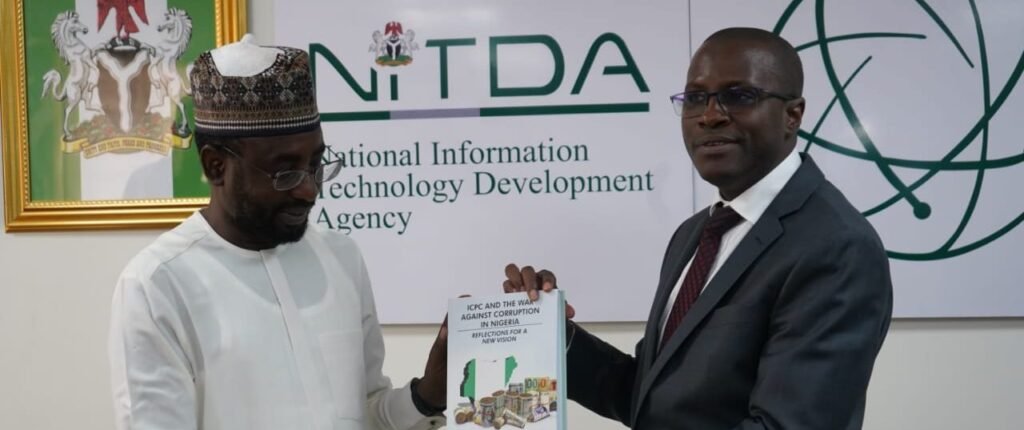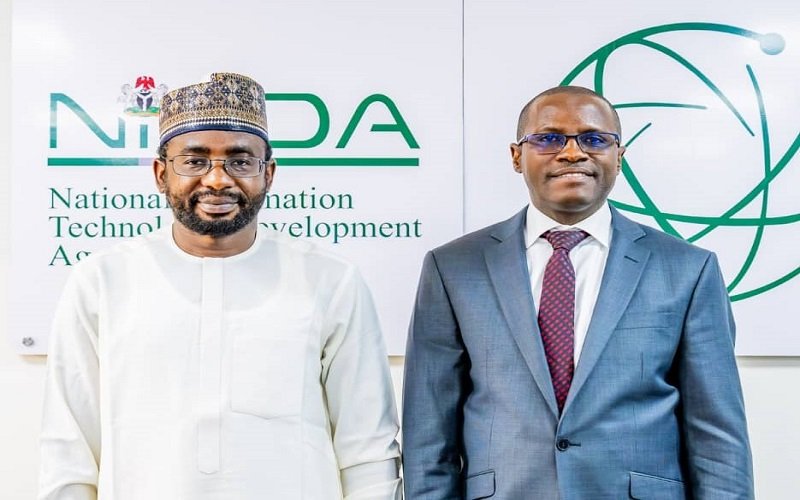The Independent Corrupt Practices and Other Related Offences Commission (ICPC) and the National Information Technology Development Agency (NITDA) have renewed their resolve to tighten oversight and enforcement of IT project clearances across the federal public sector in Nigeria. In a strategic meeting held in Abuja, both agencies affirmed that ensuring compliance with digital infrastructure standards is no longer optional — it’s essential for integrity, accountability, and effective public service delivery.
Here is a refined, engaging account of that development — capturing the stakes, the motivations, and what lies ahead.
Table of Contents

A Meeting with Purpose: Reaffirming Institutional Ties
On a crisp morning in Abuja, Dr. Musa Adamu Aliyu, SAN, Chairman of ICPC, welcomed Mr. Kashifu Inuwa Abdullahi, the Director-General of NITDA, along with his top management team to the ICPC headquarters. Their meeting was more than ceremonial — it set the tone for a reinvigorated partnership rooted in shared values of transparency and technology-driven governance, according to icpc.gov.ng.
Dr. Aliyu reflected on the historical rapport between both agencies, noting that shortly after assuming office, his first official visit was to NITDA — signaling the importance he placed on digital transformation early in his tenure. Over the years, he asserted, key initiatives discussed on that first collision course had steadily found their way into implementation.
He underscored that in today’s interconnected environment, government operations cannot function effectively without resilient, secure, and legally compliant IT systems. His pledge: ICPC, within its mandate, would act decisively to support and enforce the ICT rules that underpin credible and safe digital services in government.
NITDA’s Ambition: Standards, Certification, and Digital Inclusion
From the NITDA side, Mr. Abdullahi made clear the purpose of his visit — to secure ICPC’s backing in enforcing compliance among federal agencies, especially regarding IT investments and project clearances.
He laid out several flagship initiatives currently underway:
- One Government Digital Services policy: A push to centralise and standardise how government online services are designed, implemented, and maintained.
- Certification of IT system builders: Establishing accreditation frameworks to ensure that contractors and developers who deploy government systems meet prescribed quality and security benchmarks.
- Quality assurance of systems: Ensuring that deployed systems deliver on functionality, reliability, and security from the outset.
Furthermore, Mr. Abdullahi disclosed a future project aiming to build and manage websites for all local government areas across Nigeria — an ambitious step to promote digital transparency, accountability, and connection at the grassroots level.
Recognising that policy and technical standards alone are insufficient, his ask was plain: the ICPC must help drive enforcement, making compliance not optional, but a required pillar of government digital procurement.
Convergence of Mandates: Compliance, Anti-Corruption, Digital Governance
Although ICPC and NITDA sit under different branches of government oversight, their mandates intersect in critical ways — especially in the realm of public technology deployment. The duo agreed that working in silos would no longer suffice; a joint approach is needed to uphold integrity in IT procurement and service delivery.
Enforcement Backed by Legal and Institutional Power
ICPC’s role in investigating, prosecuting, and preventing corrupt practices places it in a unique position to enforce ICT compliance. By aligning with NITDA’s technical framework, ICPC can embed digital oversight into its anti-corruption mission. Dr. Aliyu’s pledge to enforce “relevant rules and standards” signals ICPC’s readiness to view deviations in IT project compliance not just as technical lapses but as potential ethical and legal violations.
A Joint Committee to Produce a Working Framework
To move from aspiration to execution, the agencies agreed to set up a joint committee that will draft a practical framework to guide their collaboration. The objective: define clear, enforceable roles, responsibilities, and processes — so that government institutions know precisely what standards they must meet and what consequences follow non-compliance.
This committee will likely address issues such as:
- How and when IT clearances must be obtained
- The certification and vetting of contractors and system integrators
- Audits, inspections, penalties, and redress mechanisms
- Reporting and transparency obligations for project status
- Coordination with other agencies (e.g. procurement, finance, audit) to prevent gaps
It is a recognition that mere guidelines without accountability rarely hold weight, especially in large federal systems.
Digital Transparency as an Anti-Corruption Tool
Beyond compliance, both agencies appear anchored on a deeper vision: using digital infrastructure as a tool for openness and civic trust. Projects such as creating standard websites for all local governments are more than vanity — they can become audit trails, communication touchpoints, and accountability engines at the grassroots.
When constituents can see how projects are initiated, funded, and executed — in real time or periodically updated — the space for under-the-table dealings narrows. ICPC’s anti-corruption posture meets NITDA’s digital ethos in this convergence.

Challenges, Implications, and the Road Ahead
The renewed ICPC–NITDA collaboration is promising, but its success depends on navigating several practical and political hurdles. Reflecting on those challenges and what’s at stake helps us understand how critical this initiative is.
Institutional Culture and Resistance
Federal agencies often have entrenched practices and internal incentives that resist extra oversight or delays caused by new clearance procedures. Bureaucracies may view enforcement as slowing down operations, leading to pushback or minimal compliance. Overcoming inertia will require consistent leadership, capacity building, and perhaps penal consequences for non-compliance.
Capacity Constraints
Certification schemes, audits, quality control checks, and continuous oversight demand technical expertise, manpower, and budget. Both ICPC and NITDA will need to scale their internal capacities and possibly partner with external vendors or international bodies to carry out their work effectively.
Inter-Agency Coordination
ICT project clearance often involves multiple stakeholders — procurement bodies, finance ministries, security agencies, auditors, and line ministries. Harmonising their procedures, sharing data, and aligning mandates can be complex. The joint committee must engage all relevant agencies early to prevent downstream conflicts.
Enforcement Willingness
It’s one thing to draft standards; it’s another to punish violations. For the collaboration to have teeth, ICPC must be prepared to investigate and sanction non-compliance, even when it involves influential agencies or projects. That means transparency in sanctions and political backing from oversight bodies (legislature, executive, civil society).
Public Trust and Expectations
As this initiative takes shape, government institutions will face enhanced scrutiny from citizens, civil society, and the media. Any lapses, perception of bias, or slow rollout could erode confidence. On the other hand, visible wins — thwarting misuse of IT funds, halting low-quality projects, or revealing wrongdoing — will reinforce legitimacy.
Scaling from Federal to State & Local Levels
While the current focus is on federal IT projects, to achieve genuine digital governance across Nigeria, the model must be replicated at subnational levels. States and local governments — which receive significant portions of national funds — must be integrated into the oversight regime eventually.

Conclusion: A Turning Point for Digital Governance in Nigeria
The ICPC–NITDA partnership marks more than a meeting between bureaucracies — it signals an evolution in how Nigeria confronts the challenges and opportunities of government IT investment. By weaving compliance, enforcement, and accountability into the lifecycle of digital projects, Nigeria can begin to close the gap between ambitious aspirations and on-the-ground realities.
From the eyes of a citizen, this presents hope: a future where government websites aren’t just window dressing, where federal investments in ICT don’t disappear in cost overruns or shady procurement, and where a district’s website truly reflects what’s happening on the ground. For both agencies, the coming months will be critical — the joint committee, enforcement mechanisms, and institutional courage will determine whether this is a breakthrough or another well-meaning announcement.
In Nigeria’s journey toward responsive, transparent, and tech-enabled governance, this partnership is one of its boldest steps yet. As the framework is developed, and as compliance becomes less of a choice and more of a standard, Nigeria could be setting a template for how emerging democracies integrate anti-corruption principles into their digital futures.
Join Our Social Media Channels:
WhatsApp: NaijaEyes
Facebook: NaijaEyes
Twitter: NaijaEyes
Instagram: NaijaEyes
TikTok: NaijaEyes
READ THE LATEST EDUCATION NEWS





